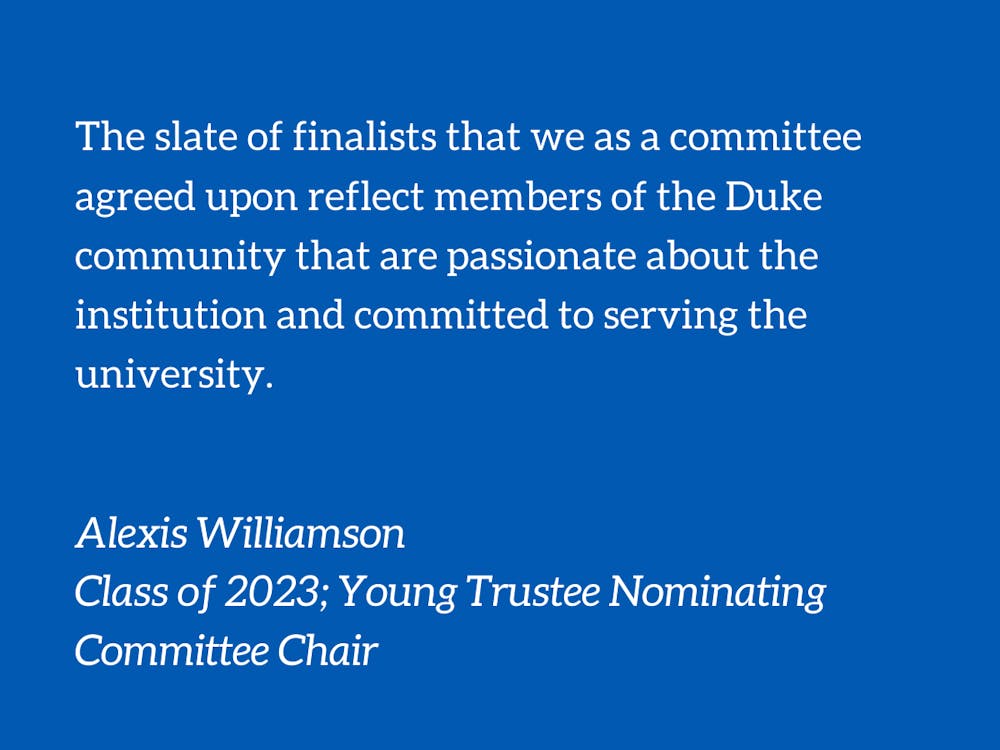I am writing on behalf of the Young Trustee Nominating Committee (YTNC) to provide clarity regarding the process for selection of the Undergraduate Young Trustee. I would like to first re-iterate my appreciation for the work that the committee has done since November 2021. Many hours have been dedicated to this process and I appreciate all the time spent in service to the University by my fellow committee members.
The process for the formation of this year’s Undergraduate Young Trustee Nominating Committee began in October of 2021 when Maggie Epps, secretary to the Board of Trustees and chief of staff to the president, sent an email inviting all undergraduate students to apply to at-large positions on the committee. The rest of the committee was selected from students that represent several constituencies on campus and/or serve on a Board of Trustees standing committee or participate in the strategic education program for the 2021-2022 academic year. Let me be clear: Students were not chosen based on their affiliations with any potential candidate and the committee is seated through the Office of the Secretary. Each member of the committee has a passion for making Duke a better place and has committed themselves to serving the University. The YTNC was fully formed prior to the opening of the Young Trustee application period.
After the committee was seated, members worked to revise the application from its previous iterations. All university undergraduates were invited to apply for the position through several email communications from Maggie, with the position also being posted on social media and through various points throughout campus, inviting anyone who was interested in and passionate about the role to apply. Because of the nature of the position, it is common for those who are currently serving, or have previously served, on a Board of Trustees committee to apply. It is also common for those who are involved in student government to apply because of their familiarity with the institution and their interest in university governance. Participation in these systems is beneficial to an applicant, in that it demonstrates relevant experience, but in no way is it the sole qualifier for an excellent candidate for Young Trustee.
Prior to reviewing any applicants, members of the committee received a bias training with Dr. Leigh-Anne Royster, assistant vice president for diversity, equity and inclusion, as well as a conflict of interest briefing with Ms. Leigh Goller, chief audit, risk and compliance officer. Disclosures of any bias or conflicts of interest are dealt with internally through the committee, as the deliberations of the committee are confidential.
After a blind review of applicants, the committee discussed each applicant and came to a consensus about who would move forward as a semi-finalist and receive an interview. This year’s semi-finalist interview questions were unique from previous years and agreed upon by this year’s committee.
The nomination of a Young Trustee is not a popularity contest. In fact, the process was revised to avoid the position being seen as an indicator of who is the most popular on campus, instead of who is most qualified to serve in the role. The revised process is not based on any individual’s relationship to committee members, and student input and involvement remains encouraged and readily available. Students are invited to apply to serve on the YTNC as an at-large member, anyone is invited to apply to serve as Young Trustee, and all undergraduates are invited to the YT Finalist Meeting which was held on March 15 and included a feedback survey through which undergraduate students were invited to provide their input about the slate of finalists. This meeting was also recorded and students who were unable to attend the session in person had the option to watch the full recording and submit their feedback if 90% of the video was viewed. When the committee reaches its final recommendation, it will be presented to President Price, along with feedback received through this survey, so that he can make the final decision about a nomination.
There are professional relationships that exist between members of the committee and each finalist. The slate of finalists that we as a committee agreed upon reflect members of the Duke community that are passionate about the institution and committed to serving the university. As such, it is only natural that we have encountered each other as active members of the Duke community This does not, however, mean that the committee is incapable of considering all applicants and finalists fairly. Once again, major and minor conflicts of interest are dealt with internally and the committee comes to a consensus about how to proceed with these conflicts.
As stated above, many hours have been dedicated by each member who serves on the YTNC, and I am proud of the work that has been done by the committee this year. Not only am I confident that our final recommendation will be in the best interest of the university and its future, but I am also confident in the process that the university has created for the selection of the undergraduate Young Trustee. Through this process, three incredibly qualified applicants were selected as finalists and I look forward to having one of them serve as a fiduciary of this institution.
Alexis Williamson is a Trinity junior and Young Trustee Nominating Committee Chair.
Get The Chronicle straight to your inbox
Signup for our weekly newsletter. Cancel at any time.

